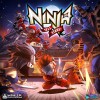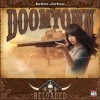profile badges
...
...
...
...
recent achievements

Rated 5 Games
Rate 5 games you have played.
Rate 5 games you have played.

Gamer - Level 1
Earn Gamer XP to level up!
Earn Gamer XP to level up!

Rated My First Game
Rate a game you have played.
Rate a game you have played.

I Own a Game!
Mark a game that you own by clicking the "Own It" button on a game page.
Mark a game that you own by clicking the "Own It" button on a game page.






Doomtown: Reloaded - Base Set
Pick your faction, build your deck, and fire in the old west world! In Doomtown: Reloaded (2014) the objective of the game is to dominate as many control points as possible in the town of Gomorra through poker hands, shootouts, and special card abilities. Based on Deadlands: Doomtown Collectible Card Game from the ‘90s, this western expandable card game allows players to build their own decks of 52 cards to duel with other players.
The purpose of this review is to briefly explain the game world and gameplay, but first there are a few things players should know in order to make the game more accessible. For one, it can take a while to get used to the “old western world language,” so spending time getting used to this vocabulary will help one to better understand the rules. Additionally, players should not immediately open the decks of cards and mix them together if they plan to follow the tutorial, as it requires players to use the cards in the packaged order. Finally, it’s a good idea to buy some card sleeves. The board can get so cluttered with cards that players can benefit greatly from an additional means of visual organization. Controlling board clutter is really important when determining what types of cards are in play, and most importantly, when determining victory.
To win Doomtown: Reloaded, a player must control Gomorra by the end of the Sundown phase by having more control points than the opponent’s influence points. These points are included on certain types of cards. All cards have their own suit, rank, ability, and cost. Diamond suit cards (called deed cards – these are the playable locations) show the number of control points they signify, while spade suit cards (called dude cards – these are the game characters or people) denote the amount of influence points they include. But how does a player take control of a deed? In order to control an active deed, a player needs to move a dude into it, regardless of the deed’s card owner.
The other two suits, hearts and clubs add nuance to shootouts and other interactions by bringing items and special actions into the game. Hearts are divided into goods and spells cards. These cards are used in shootouts and need to be attached to a dude to be active in the game. Horses, spells, and weapons are some examples of cards in this suit. On the other hand, clubs are called action cards. These cards are special events or powers that can be called directly from a player’s hand to take certain advantages, such as re-draw cards. Most action cards cost zero in-game currency, unlike cards of other suits.
A player’s deck includes one gang’s outfit card, also known as the home of the player. Doomtown: Reloaded offers four different outfits for the player to choose from, each one with a certain amount of in-game currency to start with: The Law Dogs (the “good” guys), The Sloane Gang (the “bad” guys), The Morgan Cattle Company (the businessmen), and The Fourth Ring (the circus freaks). Some dude cards are related to their outfit cards, and some are not. Dudes that belong to a different gang than the outfit the player has chosen must pay extra in-game currency to keep them in play. Last but not least, there is also a joker card that can be built into a deck to be used for pulls and draw hands only (poker decision situations, representing any card – value and suit – the player wishes).
By now, the essence of each suit in the deck is understood, as well as and that deeds and dudes. But that is not all – each card also has a cost in order to be played (except most cards in the clubs suit, as stated before), and some of them also produce in-game currency – known as ghost rocks – in the Upkeep phase of the game (which will be explained further). Besides that, dudes, goods, and spell cards also have a fire-power related to them broken into silver (stud) and copper (draw) bullets, increasing the chances of the player to build a better poker hand for the shootout by drawing or re-drawing extra cards.
Knowing the information on each card is important for deciding on actions the player can take. A player’s deck is always faced down, and cards are drawn from it to use in two different hands. The play hand uses mostly the card abilities and the poker hand uses only the suit and rank of each card. Each player also has a face-up discard pile, an “aced” cards pile called boot hill (these cards are permanently removed from the game). A player can place a card in the game field vertically (meaning that it can still use the special ability and move/have an action) or horizontally (meaning it used the special ability already; this is called booting the card and it cannot make extra moves or call a shootout until it becomes “unbooted”). If a player runs out of cards, the discard pile is reshuffled and used as a new deck.
The game cycles are divided into four phases. The Gamblin’ phase decides which player goes first in a round, and is determined by a lowball five-card draw poker game. In the Upkeep phase players collect the amount of ghost rocks on their outfit card and possibly deeds, gather production cards, and pay for the dudes in play. The High Noon phase is used to make moves in a turn-based system for each action, starting with the Gamblin’ phase winner. During this phase, players can call a shootout, move, shop, and trade. Lastly is the Sundown phase, which occurs after all players pass in the High Noon phase. Players check to see if there is a winner by counting and comparing influence and control points. This phase is also used to draw and discard cards to complete the play hand and unboot all the booted cards from the High Noon phase. The game then continues into the Gamblin’ phase and continues until there is a winner in a Sundown phase.
Even though there is a lot of information, rules, resources, and statistics to absorb, the game includes a board to be used as the game field and tokens to help keep track of variables. The board, called an example street, helps to organize the setup for the game, and has useful information, such as how to form a posse, move the cards from one place to another, decide the winner in a shootout etc. The tokens – called counters – come in different colors, numbers and textures, representing the ghost rocks currency, control points, influence points and extra in-game variation. Both board and counters are really helpful, but still don’t compensate for the amount of variables the player has to keep track of in the game. It can be really tiring to play Doomtown: Reloaded, and it doesn’t live up to the excitement of a “poker based collectible card game.” The old western chaos theme might grab the attention of consumers, but even the “western terms” used to create the game world are confusing and frustrating to new players.
There is a clear need to build decks effectively in order to balance the abilities, its costs, and the poker hands (mainly because there are some cards with a special ability to punish “cheating hands,” which occur when there are double value/suit cards in a hand). This is certainly a game of patience in terms of learning. The odds of falling in love with it the first time playing it are really low, so it’s recommended to play at least three or four times before making a final decision on whether it is enjoyable or not. In other words, this game is not very accessible and is geared towards a certain audience of gamers. There are some interesting mechanics to deal with that can be really amusing – such as managing money to place cards, creating traps for opponents with the assistance of keeping hands secret, building a deck aiming to balance poker and play hands, or avoiding cheating hands. Overall, the mechanics create an exhausting and complicated system to play in, dragging with them the potential to be immersed in the experience.